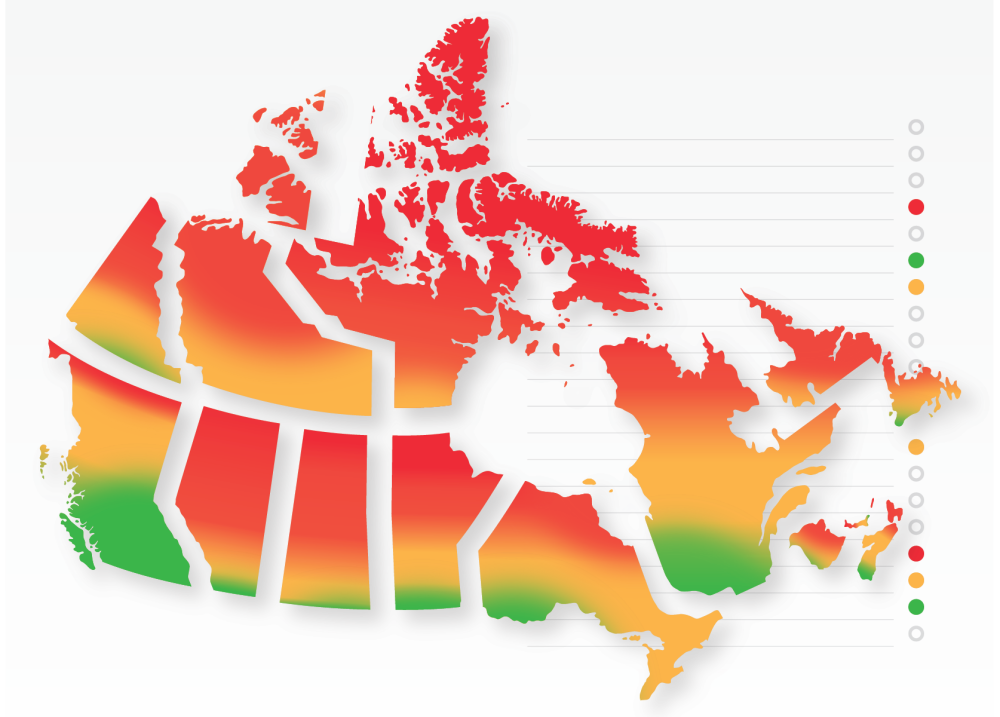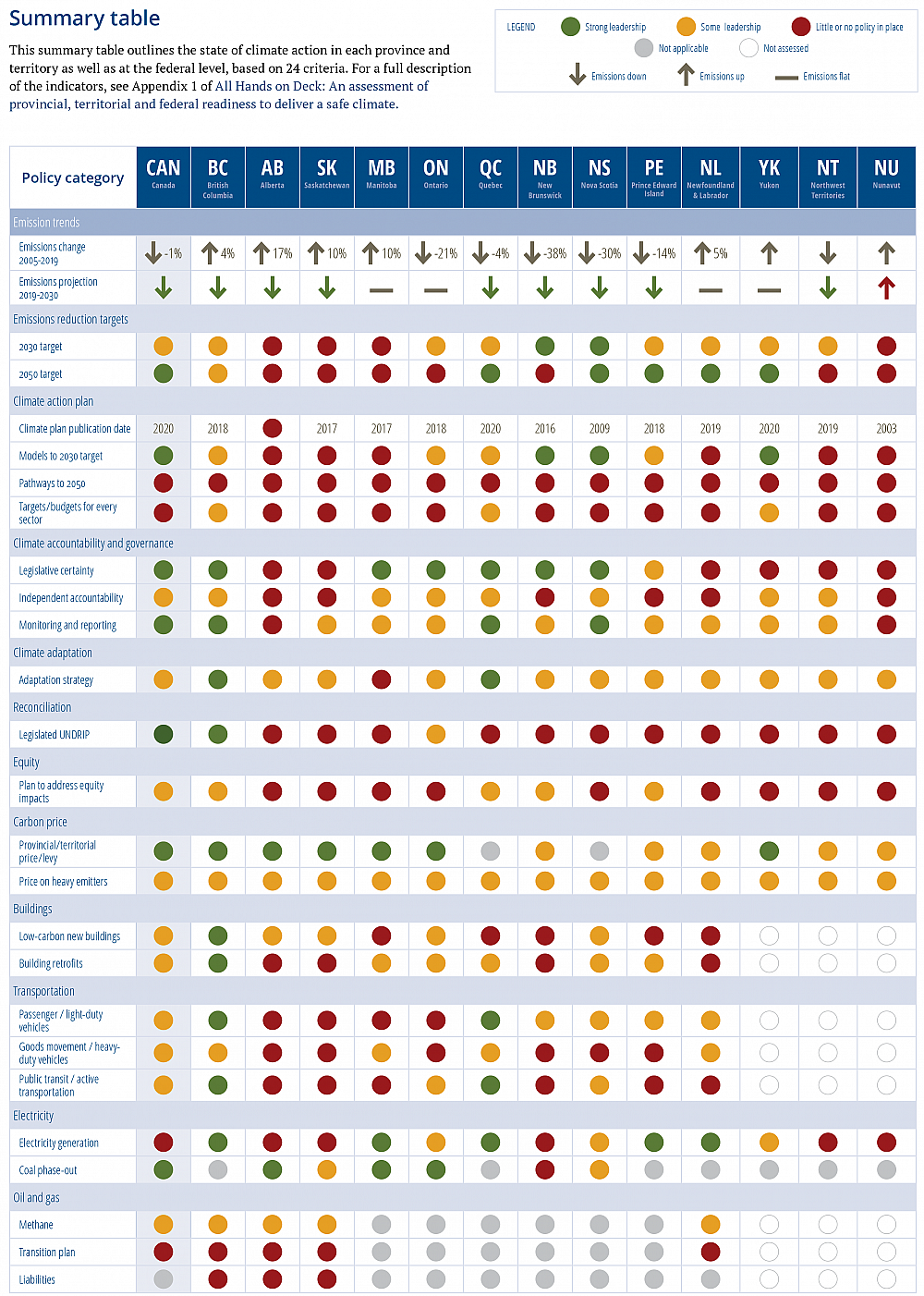OTTAWA — Though Canada’s provinces and territories hold much of the power over the country’s energy resources, the majority lack the policy infrastructure and measures necessary to achieve significant greenhouse gas emission reductions, new research shows.
To determine climate readiness, the Pembina Institute and Simon Fraser University’s School of Resource and Environmental Management assessed each province, territory and the federal government on 24 indicators foundational for climate success. Governments were invited to review the accuracy and completeness of the data and summary for their region. The findings, priorities for action for each government, and recommendations are published today in All Hands on Deck: An assessment of provincial, territorial and federal readiness to deliver a safe climate. The evaluation found that:
- Not a single province, territory, or even Canada’s federal government is fully prepared to make the emissions cuts necessary to help achieve 2030 and 2050 climate targets;
- Although the federal government has set 2030 and 2050 targets, 50% of national emissions (from Alberta, Saskatchewan and Manitoba) are not covered by a provincial or territorial 2030 target, and almost three-quarters (74%) of national emissions (from Alberta, Ontario, Saskatchewan and Manitoba) are not covered by a provincial or territorial 2050 target;
The two sectors driving emissions growth — offsetting decreases elsewhere — are oil and gas, and transportation. Since 2005, emissions from Canada’s oilsands increased 137 per cent, and emissions from transportation increased 16 per cent, with freight emissions increasing at three times the rate of passenger emissions. However, the evaluation found that:
- None of the oil- and gas-producing provinces are preparing for the decline of oil and gas with transition plans and sufficient measures to deal with fossil fuel liabilities;
- No jurisdiction is utilizing all of the policy tools available to dramatically lower transportation emissions.
Though climate success does not require a uniform approach for every province and territory, the evaluation did reveal six actions urgently needed across Canada. To plan for climate success:
- Federal, provincial and territorial governments need to set higher emissions reduction targets and shrinking carbon budgets;
- To deliver on targets, provinces and territories need accountability legislation with climate modelling and independent verification;
- Provinces and territories need to prioritize reconciliation and equity.
To address sectoral emissions:
- Federal, provincial and territorial governments need to set sectoral budgets and plan to respect them — focusing on the highest-emitting sectors first;
- Oil- and gas-producing provinces and territories need to create inclusive, equitable transition plans for the oil and gas sector based on net-zero pathways;
- Provinces and territories need to decarbonize passenger and freight transportation, and increase access to public transit and forms of active transportation.
Find the full table of indicators and findings below. The full report also outlines climate policy wins and priorities for action for each jurisdiction.
Quotes
“Climate success requires all hands on deck. Our findings show that across Canada, provinces and territories are unprepared to deliver the emissions reductions needed for a safe climate. As an oil- and gas-producing country, Canada has an opportunity to be a global leader in decarbonization and to position its economy and workforce for success in emerging industries and technologies ﹘ but all levels of government have a role to play in reducing emissions. It’s time for Canadian provinces and territories to do more. Across Canada, climate action must be pursued in collaboration with Indigenous Peoples and impacted workers and communities. Addressing inequities should be at the heart of climate planning.”
— Linda Coady, executive director, Pembina Institute
“Because the oil and gas and transportation sectors threaten Canada’s ability to deliver on climate targets, bold, immediate action is needed to transform these sectors. We can no longer afford the delays that come from dismantling and redesigning policies. It’s time to scale up, not water down through weak implementation and offsetting policies elsewhere. At all levels, climate-safe carbon budgets and legislated accountability to the people are must-haves — not nice to have — to deliver on promises now and beyond the next election cycle.”
— Isabelle Turcotte, federal policy director, Pembina Institute
“With the highest emissions in Canada and a trajectory headed in the wrong direction — up 17% between 2005 and 2019 — Alberta has hard work to do to drive proactively toward a lower-carbon future and diversified economy. Alberta needs a net-zero commitment and a pathway to reach this goal. This means setting 2030 provincial and sectoral targets consistent with Paris climate commitments, and time-bound, measurable steps to decarbonize the oil and gas sector. The province also needs to start preparing a transition plan for the oil and gas sector that protects workers and communities and limits public liabilities. Alberta can leverage its history of climate policy, climate reporting and innovation to set and achieve climate goals.”
— Chris Severson-Baker, Alberta regional director, Pembina Institute
“Ontario made great gains phasing out coal, which contributed to the province’s 21 per cent drop in emissions between 2005 and 2019, but Ontario’s downward trend has reversed in recent years. Between 2017 and 2019, emissions in Ontario went up five million tonnes. On both emissions trend and policy, the province is moving in the wrong direction. That matters — Ontario is the second highest emitter in Canada. Ontario needs to commit to net-zero emissions by 2050, and develop a pathway to reach this goal. And since transportation, buildings and industry are the highest-emitting sectors, the province should focus on cutting emissions from those sectors first.”
— Carolyn Kim, Ontario regional director, Pembina Institute
“Despite the fact B.C. has shown real climate policy leadership, the province’s emissions are going up. B.C. needs to strengthen its climate plan to put the province on track to its current 2030 target. Emissions growth in the province is being driven by increasing transportation and oil and gas emissions. B.C. needs to focus on either increasing the stringency of the province’s carbon tax, or high-impact regulations like a zero-emission vehicle mandate or its Renewable and Low Carbon Fuel Requirements. B.C. also needs to plan a transition in the gas sector that supports workers and communities and limits public liabilities. New projects, such as new liquefied natural gas plants, that increase B.C.’s carbon pollution are not compatible with the net-zero goal.”
— Karen Tam Wu, B.C. regional director, Pembina Institute
[30]
Download a copy of All Hands on Deck: An assessment of Canadian readiness to deliver a safe climate.
Contact
Sarah MacWhirter
Director, Communications, Pembina Institute
416-389-7465
Background
Report: How to Get Net-Zero Right: Principles, tools and steps for safe, inclusive net-zero pathways
Blog: Emissions improvements at some facilities are encouraging but not reflective of oilsands overall
Report: Building a zero-emission goods-movement system
Report: Alberta’s Emerging Economy: A blueprint for job creation through 2030
Report: A resilient economy and safe climate: Our vision for B.C.
Issue paper: Does Canada’s net-zero math add up?
Media primer: Media briefing on Canadian methane regulations
Research summary: Diesel Reduction Progress in Remote Communities
Report: A New Canadian Accountability Act
Report: The oilsands in a carbon-constrained Canada





